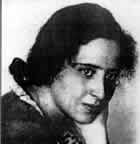72 ordspråk av Hannah Arendt
 Hannah Arendt
Hannah Arendt
Hannah Arendt föddes den October 14th 1906 och dog den 4 December 1975 - German poli sci
Mer info via Google eller Bing.
Mer info via Google eller Bing.
Number of proverbs are 1469552
varav 1407627 på engelska
Proverb (1469552 st) Search
Categories (2627 st) Search
Authors (167535 st) Search
Photos (4592 st)
Born (10495 st)
Died (3318 st)
Dates (9517 st)
Countries (5315 st)
Idiom (4438 st)
Lengths
Toplists (6 st)
This website focuses on proverbs in the Swedish, Danish and Norwegian languages, and some parts including the links below have not been translated to English. They are mainly FAQs, various information and webpages for improving the collection.
Här har vi samlat ordstäv och talesätt i 35 år!
Vad är proverb?
Hur funkar det?
Vanliga frågor
Om samlingen
Ordspråkshjältar
Hjälp till!
varav 1407627 på engelska
Proverb (1469552 st) Search
Categories (2627 st) Search
Authors (167535 st) Search
Photos (4592 st)
Born (10495 st)
Died (3318 st)
Dates (9517 st)
Countries (5315 st)
Idiom (4438 st)
Lengths
Toplists (6 st)
This website focuses on proverbs in the Swedish, Danish and Norwegian languages, and some parts including the links below have not been translated to English. They are mainly FAQs, various information and webpages for improving the collection.
Här har vi samlat ordstäv och talesätt i 35 år!
Vad är proverb?
Hur funkar det?
Vanliga frågor
Om samlingen
Ordspråkshjältar
Hjälp till!
 |
This website focuses on proverbs in the Swedish, Danish and Norwegian languages, and some parts including the links below have not been translated to English. They are mainly FAQs, various information and webpages for improving the collection.
Här har vi samlat ordstäv och talesätt i 35 år!
Vad är proverb?
Hur funkar det?
Vanliga frågor
Om samlingen
Ordspråkshjältar
Hjälp till!

